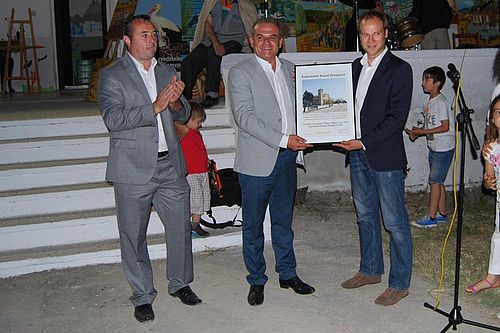“European Stork Village” 2016 designated
A new village has joined the already impressive network of European Stork Villages on Saturday. On 11th June the nature conservation foundation EuroNatur awarded the title of European Stork Village 2016 to the Greek village of Poros.

Greek Village is now Member of the International Network
Radolfzell. A new village has joined the already impressive network of European Stork Villages on Saturday. On 11th June the nature conservation foundation EuroNatur awarded the title of European Stork Village 2016 to the Greek village of Poros. “Poros has been actively engaged in supporting white storks and plans to carry out a comprehensive programme in the coming years in order to protect the elegant birds more effectively and improve their habitat. We wish to give them our support in this.” says Gabriel Schwaderer, executive director of EuroNatur.
Poros is part of the municipality of Feres on the edge of the Evros-Delta on the Greek-Turkish border. The water meadows, lagoons and rice fields in the surroundings of the Evros that are often flooded offer a bountiful supply of food for the white storks making the region one of their most important breeding grounds in Greece. Roughly 200 square kilometres of the delta are protected as a national park. The National Park Management, the newly-founded local stork initiative Ciconia, the municipality of Feres, and the inhabitants and council in Poros are working together to give the storks optimum living conditions in the future too.
The National Park Management has been carrying out a systematic count of the storks since 2004 in order to keep an eye on the population development of these elegantly gliding black and white birds. So far the storks have been nesting solely on electric pylons. The municipality wants to install artificial nesting platforms with the support of the electricity company HEDNO as an alternative.
In a first step HEDNO has already introduced technical measures to minimize the risk of birds being killed by electric shock. The foraging grounds of the storks are also to be improved. Numerous wetlands and meadows along the delta have been turning into scrubland over the past years as farmers have given up extensive grazing the land.
The management of the national park plans to reopen these areas through strategic grazing projects. The village authorities in Poros and its partners are placing great emphasis on raising awareness in the local population. They are starting with the youngest to raise awareness for the protection of storks by setting up an environment consciousness project on the white storks in three primary schools in the municipality and this is to be extended in the coming years. In addition the inhabitants of Poros are going to celebrate „their storks“ in a big festival every year at the end of May.
The municipality is hoping to attract many visitors to Poros and to fire people beyond the region too with enthusiasm for the cause of protecting the storks and their habitat.
Background information:
The European Stork Village initiative: EuroNatur has been searching out villages and municipalities in which there are many storks in residence and where the local people are engaged in protecting them and has honoured them with the designation of European Stork Villages ever since 1994. In this way EuroNatur is building up a growing alliance for the protection of these large birds to counter the increasing loss of habitat for white storks in Europe. Poros is Stork Village number 15. In Germany the village of Rühstädt in the biosphere reserve „Elbe Brandenburg River Landscape“ has been part of the network since 1996.
Enquiries: EuroNatur, Konstanzer Str. 22, 78315 Radolfzell, Tel.: 07732 - 92 72 24, Fax: 07732 - 92 72 22, E-Mail: info(at)euronatur.org, Contact: Gabriel Schwaderer, Press contact: Christian Stielow
 Report sighting
Report sighting
Have you seen a white stork or another interesting species of animal, plant or fungus? Make your observation count for nature conservation and share it with other nature lovers! It’s free and it’s fun!





